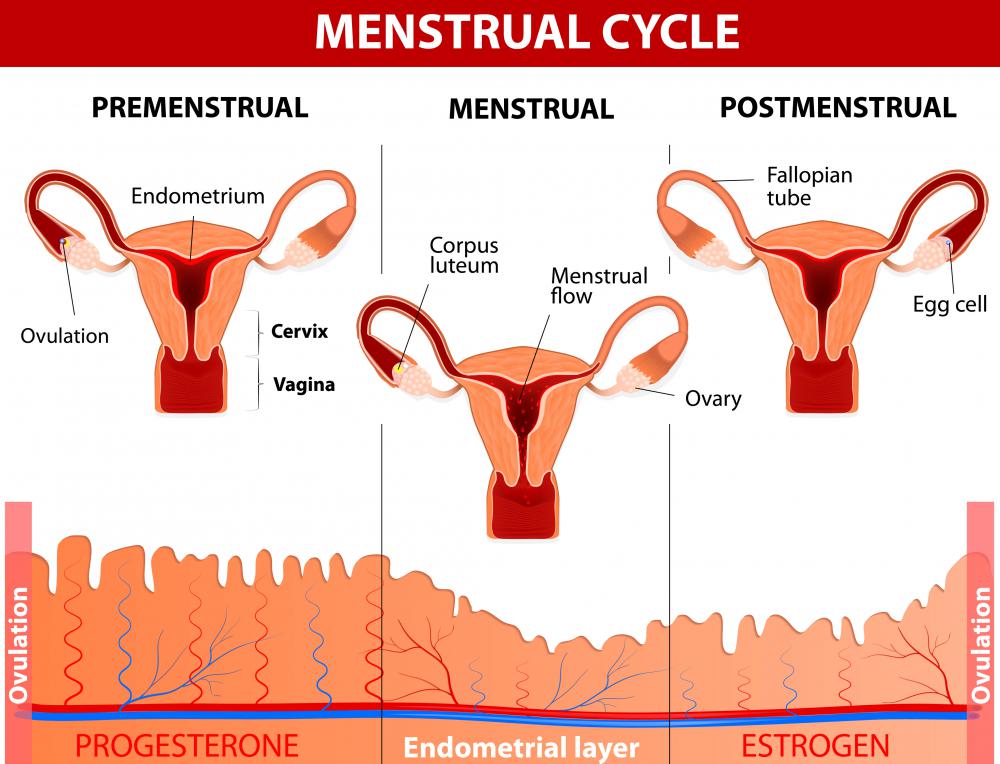At WiseGEEK, we're committed to delivering accurate, trustworthy information. Our expert-authored content is rigorously fact-checked and sourced from credible authorities. Discover how we uphold the highest standards in providing you with reliable knowledge.
What is Progesterone Deficiency?
Progesterone deficiency is a condition in which the body does not produce enough progesterone, an important hormone to the female reproductive system. Having too little progesterone normally occurs when a woman hits menopause, but can also occur earlier in life. Progesterone deficiency can cause infertility, irregular periods, ovarian cysts, anxiety, breast tenderness, bloating, mood swings, weight gain, and miscarriage. Progesterone is naturally produced in both men and women, but it plays a much larger role in the female body.
Women produce progesterone in the ovaries, which are located in the pelvic region and have the responsibility of producing eggs and hormones. During a normal menstrual cycle, progesterone levels start off low and then climb during ovulation, the time between when an egg is released from an ovary and when that egg ceases to be viable. During ovulation, an egg is released from a follicle in one of the ovaries, and the rupture of the follicle triggers the production of progesterone. The progesterone then begins preparing the wall of the uterus for the implantation of a fertilized egg. If the egg does not get fertilized, progesterone levels drop and the woman menstruates, or gets her period.

If the egg does get fertilized and implants in the uterus, progesterone helps to lower the woman’s immune response so it doesn’t attack the fetus. The placenta, an organ that develops alongside the fetus in the uterus during pregnancy, also begins producing progesterone, so that the woman’s overall progesterone production increases tenfold. Progesterone deficiency can cause problems in pregnant and non-pregnant women.

One of the most common issues associated with progesterone deficiency is polycystic ovarian syndrome, or PCOS. This occurs when the ovary releases an egg each month, but the follicle fails to rupture and start progesterone production. The body will then start producing more hormones to try to stimulate ovulation and progesterone production again, but these follicles may also fail to rupture. This condition can cause mood swings, irregular or missed periods, heavy cramping and bleeding, weight gain, anxiety, breast tenderness, carbohydrate cravings, acne, excessive hair growth, and infertility. Without progesterone, the egg may have a difficult time implanting in the uterus, even if it is dropped from the ovary and fertilized.

Progesterone deficiency during pregnancy can lead to miscarriage. Along with preparing the pelvis for labor, preventing lactation until delivery, and many other functions during pregnancy, progesterone prevents the body from shedding the lining of the uterus. If progesterone levels drop too low during pregnancy, or if progesterone receptors are unable to access the hormone, the woman may lose the embryo, usually during the first trimester.

Progesterone levels also drop after women hit menopause, about a year after their last menstrual period. Though this is a normal hormonal change, some women have severe symptoms of hot flashes, weight gain, mood swings, anxiety, insomnia, and hair loss. Treatment for progesterone deficiency for menopausal women, pregnant women, or women of child-bearing age is similar. These treatments include reducing stress, so that progesterone doesn’t have to compete with stress hormones, herbal remedies such as black cohosh, and hormone replacement therapy. Hormone replacement therapy is done with the help of a doctor and may come in pill or cream form.
AS FEATURED ON:
AS FEATURED ON:


















Discussion Comments
Progesterone cream can be used to treat things including depression in men. IT can also be used to treat bloating or swelling, increase someone's sex drive, low blood sugar,increase memory function and strengthen bones. The cream might help with PMS symptoms and fibroids or myomas in the uterus.
Post your comments